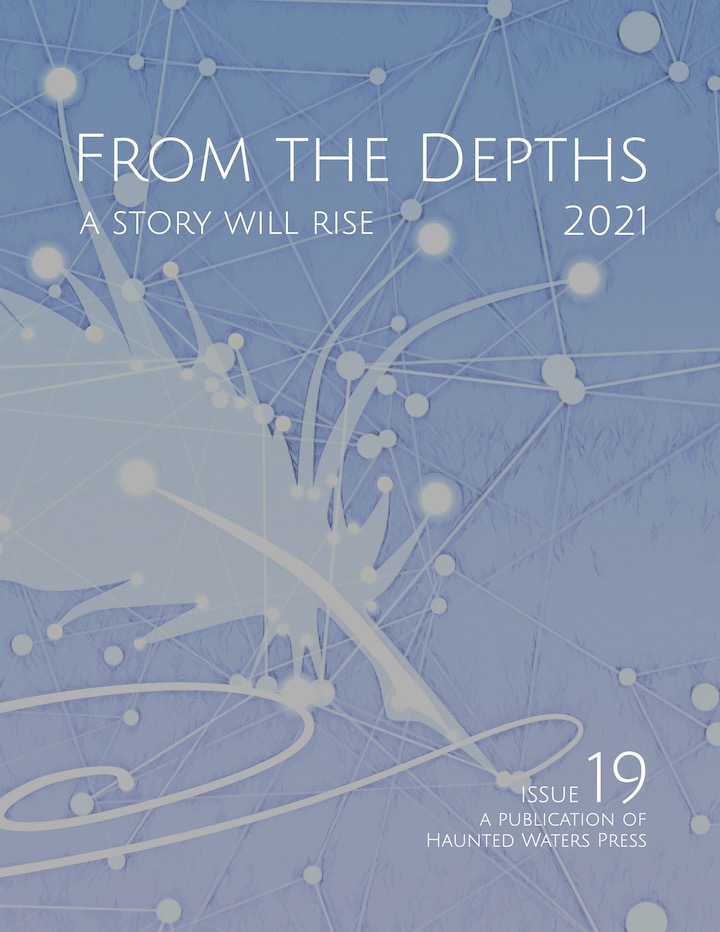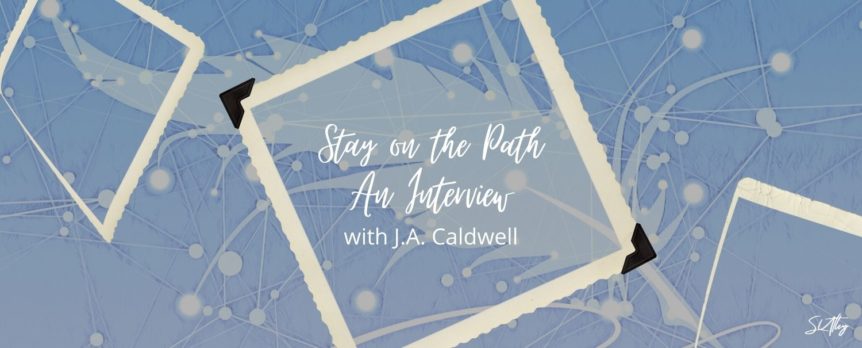An Interview with J.A. Caldwell
Welcome! Thank you for joining us for another Haunted Waters Press Featured Author Interview. In this series, we sit down with contributors to chat about their craft and explore the experiences that have shaped their writing.
Today's interview is with HWP Contributor J.A. Caldwell recipient of the 2021 Haunted Waters Press Award for Flash Fiction. Boone County Circa 1919 is featured in the 2021 issue of From the Depths. Enjoy!
I grew up surrounded by books and was read to every night from infancy on through childhood, so that likely helped. But, my first specific memory of having the urge to write was me at five, sitting with some books underneath crisp white sheets drying on the clothesline. I was looking at Wende and Harry Devlin's Old Witch Rescues Halloween, and it suddenly hit me that I could read it. Man, what a rush! I couldn't get over the fact that the authors had that much power to create a whole story which I replayed over and over again in my brain like a movie. I could hear Old Witch say "ratchafratch!" and other silly and magical words I had never considered, and it impressed me that the Devlins made that possible. I wanted in!
What draws you to flash fiction?
Necessity! Writing time is a precious commodity for me. I have kids, a full-time job, a partner, a tight-knit family, and other adult-type responsibilities that have my heart and brain occupied for a good portion of the time. I started playing around with flash pieces as a means to hot walk my writer muscles and keep myself in racing shape (my grandfather was a horse trainer, so yes I do use a fair amount of equine metaphors) — and I found it to be a pretty decent vehicle to tell the stories I wanted to get out there. I'm still plodding along with longer pieces, too. I haven't given up on a collection or novella, either.
I'm forever energized by turns of phrase and bits of dialogue, and that's how everything I write gets started.
—J.A. Caldwell
What advice can you give other writers on writing effective and meaningful stories in under 500 words?
Go for the throat as soon as you can. A flash piece, thought limited by word count, isn't the place for blasé language or ambiguities. This is your chance to break a hundred hearts in the time it takes to eat a piece of toast.
You are also a talented poet. Do you prefer one form of writing over another?
That's very kind of you to say! Poetry still feels dangerous and new to me, so I poke around there with caution. I think for me, it all comes down to figuring out the best and most natural way to walk into a story. Coleridge said something about prose being words in their best order and poetry being best words in their best order, and I interpret that to mean that poetry is what we use to send an urgent and precise message, while prose is what we turn to for ideas we need to sit with for a while. "Boone County Circa 1919" actually started out as a poem, but subsequent drafts showed me it was a flash piece.
Let’s talk first drafts. Do you compose on a computer, or are you a pen and paper writer?
I'd love to be a pen and paper writer because that's so romantic, but I'm not. There's something definite and precise about hitting a key and seeing my words march forward on the screen. I write on a rose gold MacBook Air that hugs my fingertips just right.
What time of day can we find you writing?
I write late, late at night, after everyone I love is in bed, and it's just Floyd (the photogenic Basset Hound) and me.
Do you ever give up on an idea? How do you know when a piece just isn’t working?
I don't give up on much, but when I do, it's because I've stopped sweating about it. If I don't sweat when I write, I know the thrill is gone.
As a writer, do you find yourself constantly seeking inspiration in the world around you, or do you let the ideas come to you?
I'm a true extrovert, an ENFJ on the Myers-Briggs scale. I need people and people's words in order to stay sane, and this figures heavily into my writing. It is always first through language that I find inspiration. I'm forever energized by turns of phrase and bits of dialogue, and that's how everything I write gets started. Anything—a line from Tennyson or a conversation rattling around in my brain for years after a chance encounter in an elevator—this is how stories find their way to me. That's also how I fall in love.
What is the best piece of writing advice you’ve been given?
At UNCG, my professor and thesis chair was Michael Parker. In a discussion about what to do with ancillary characters as a story develops, I was really conflicted about how to (or not) make mention of them, or keep them involved in the story arc. Michael told me I was over-thinking it and that, often, when things are happening, there's this urge to get into every character's logistics and whereabouts. Don't fall for it, he told me. Don't muddy the story. "Sometimes people are just at the store and you don't need to tell everybody about it." The. Store. !
If you could tell your younger writing self anything, what would it be?
Don't freak out when you get handed a Raymond Carver story in high school, and definitely don't spend years mired in self-doubt because you don't write like that and you don't see yourself in it. Stay on the path. There's Lewis Nordan and Dorothy Allison straight ahead. Embrace the weird.


Lightning Round with J.A. Caldwell

ABOUT THE AUTHOR
J.A. Caldwell's words have appeared in Haunted Waters Press, The Atlas Review, Flying South, Hot Flash Fiction, Juke Joint, 1808, and Go Triad. She holds an M.F.A. from the University of North Carolina at Greensboro and a B.A. from Greensboro College. She lives in Jamestown, NC, and works by day as the marketing & development manager of The Barnabas Network, a cool and spunky nonprofit furniture bank.
Share this Post

